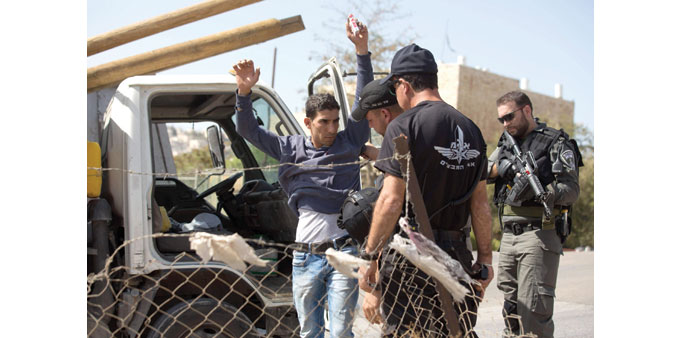Israeli border policemen check a Palestinian driver in Jerusalem yesterday.
The move to install checkpoints follows a decision by Netanyahu’s security cabinet overnight authorising police to seal off or impose a curfew on parts of Jerusalem
AFP
Jerusalem
Israel set up checkpoints yesterday in Palestinian neighbourhoods of East Jerusalem and mobilised hundreds of soldiers as it struggled to stop attacks that have raised fears of a full-scale uprising.
Hours after the first roadblocks were erected, two more stabbing incidents occurred in Jerusalem, one outside the Old City and another near the crowded central bus station during rush hour.
Addressing Palestinians for the first time since the violence began, Palestinian President Mahmoud Abbas said in a recorded televised speech he supported “peaceful and popular” struggle against Israel.
In the first of yesterday’s attacks, police said a man tried to stab a security guard at an entrance to the Old City but was shot dead before harming anyone. Palestinian media said he was a 20-year-old from the West Bank city of Hebron.
The other saw a 23-year-old Palestinian stab and moderately wound a woman of around 70 before being shot dead by police.
The incident sparked panic among commuters as armed police rushed into the bus station amid rumours of a second attacker. Police later said there had been no second suspect.
With Prime Minister Benjamin Netanyahu under immense pressure to halt the violence and frustrated Palestinian youths defying attempts to restore calm, police said 300 Israeli soldiers were joining their patrols.
The government also announced further drastic measures, including easing firearms laws for Israelis and stripping alleged attackers from East Jerusalem of their residency permits.
In Washington, a spokesman said US Secretary of State John Kerry planned to travel to the Middle East soon to seek a return to calm between the sides.
A wave of mainly stabbing attacks by Palestinians has spread fear in Israel, while a gun-and-knife attack on a Jerusalem bus on Tuesday killed two people and led to outrage among Israelis.
A third Israeli was killed in Jerusalem on Tuesday when a Palestinian attacker rammed his car into pedestrians then exited with a knife, making it the city’s bloodiest day in the current wave of unrest.
All three attackers in the two incidents were from East Jerusalem, and two were shot dead.
The move to install checkpoints followed a decision by Netanyahu’s security cabinet overnight authorising police to seal off or impose a curfew on parts of Jerusalem.
Netanyahu has faced major criticism over attacks and violent Palestinian protests in the West Bank and Gaza Strip.
The upsurge in violence that began on October 1 has led some to warn of the risk of a third Palestinian Intifada, or uprising.
Seven Israelis have been killed and dozens wounded in the attacks.
At least 30 Palestinians have died, including alleged attackers, some of them teenagers. Hundreds have been wounded in clashes with Israeli security forces.
While the stabbings and gun attack have led to Israeli anger and fear, video footage shared online of security forces shooting dead alleged attackers has fed Palestinian anger, with protesters seeing some of the killings as unjustified.
Yesterday, video purported to be of the attacker being shot while on the ground outside Jerusalem’s Old City spread on the Internet.
At the funeral for 28-year-old Moataz Zawahra, killed the previous day in clashes in the West Bank city of Bethlehem, youths with their faces covered in red keffiyeh headscarves carried his body and called him a “martyr”.
“He was on the frontline close to the soldiers and he threw firebombs,” his mother Diya said. “We are only at the beginning of the journey. As long as the occupation exists, there will be martyrs, prisoners and wounded.”
Clashes broke out after the funeral, with youths throwing stones and firebombs and Israeli security forces responding with teargas and rubber bullets—a daily occurrence in parts of the occupied West Bank over the past two weeks.
The number and extent of the checkpoints in East Jerusalem were not yet clear and appeared limited yesterday.
In the neighbourhood of Jabel Mukaber, where Tuesday’s attackers lived, four armed police were checking cars leaving the area.
“This is normal for us,” one Palestinian man in his mid-20s said with a wry smile after being stopped for about five minutes while officers searched his car and checked his ID.
Such checkpoints were used during past spikes in violence, much to the anger of Palestinian residents who consider it collective punishment.

